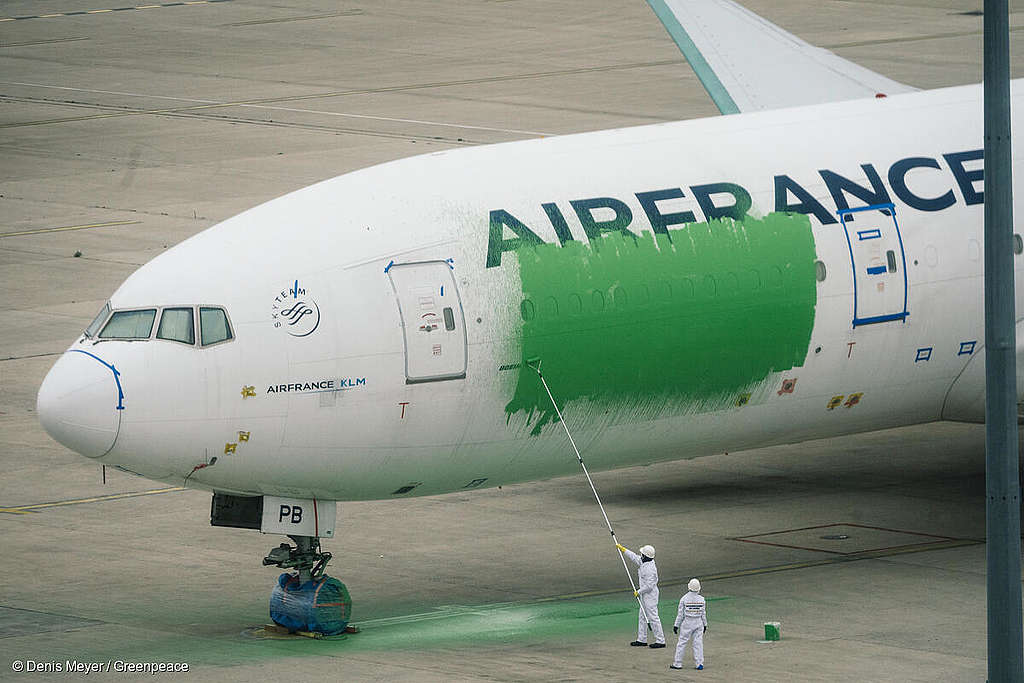Brussels – The seven biggest European airline groups are failing to take sufficient measures to reduce their CO2 emissions in line with the Paris climate agreement, according to a new report commissioned by Greenpeace Central and Eastern Europe. While European airlines would need to reduce air traffic by at least 2% annually between now and 2040 to be in line with keeping global heating below 1.5°C, none of the companies analysed has annual reduction goals for its greenhouse gas emissions, committed to reduce flights, or pledged to fully decarbonise by 2040.

Transport accounts for over two thirds of the oil used in the EU, and about one quarter of the flights in the EU currently runs on Russian oil.
Herwig Schuster, spokesperson for Greenpeace’s Mobility For All campaign, said: “Europe’s biggest airlines are putting up a smokescreen of false solutions to distract from their staggering emissions, and keep transport in the EU hooked on oil. The EU cannot let the aviation industry get away with their greenwashing anymore and must reduce air traffic, starting with a ban on short flights where reasonable train alternatives exist. Excessive oil consumption funds conflict and fuels the climate crisis, the aviation sector must play its part in bringing this to an end.”
The new research show that there is little to no substance to claims made by household names such as Lufthansa, Air France-KLM, IAG (including British Airways and Iberia), Ryanair, easyJet, SAS and TAP Air Portugal that they will cut emissions in the future. The seven companies mainly rely on false and ineffective solutions such as carbon neutrality [1], carbon offsetting [2] and so-called sustainable aviation fuels [3] to tackle emissions. In 2019, these seven airlines were responsible for the equivalent of 170 million tonnes of CO2 emissions, more than the total annual emissions of Norway, Sweden, Denmark and Finland combined.
While aviation is the fastest growing source of transport-related emissions in the EU, under current regulations airlines are not required to decarbonise or reduce flights. The sector even benefits from a large number of free pollution permits from the EU carbon market, is subsidised by public money through tax exemptions, and received over €30 billion in public support during the pandemic.
Greenpeace is calling on EU decision makers to hold airlines accountable and demand they reduce their emissions and end their dependency on oil, starting with a reduction of short-haul, business and transfer flights where reasonable train alternatives exist. The European Commission is considering revising the EU’s Air Services Regulation, and Greenpeace is calling for the inclusion of a ban on short flights where there is a train connection under 6 hours.
Notes to editors:
[1] Carbon neutrality (or net-zero) is a concept criticised by climate scientists as a “dangerous trap” based on the idea that a polluter can continue to emit CO2 and balance the emissions out by paying someone else to hopefully save emissions in the future, instead of directly reducing emissions. Six of the seven airline groups analysed pledge to become “carbon neutral” by 2050.
[2] Carbon offsets are when a polluter that has emitted greenhouse gases exchanges or ‘offsets’ their pollution with a ‘credit’ for carbon captured by someone else. It is a licence to keep polluting in exchange for carbon credits from e.g. tree planting or nature conservation projects that promise to save emissions in the future. However, research has shown that many of these projects do not actually lead to any savings in emissions: Öko-Institut investigated 5,000 CO2 compensation projects for the European Commission in 2017. Only 2% of these projects actually led to reduced CO2 emissions.
[3] Sustainable aviation fuel is an umbrella term for relatively new types of jet fuel that are mostly based on biomass and intended to replace kerosene. Agrofuel is particularly problematic, as it is often linked with the destruction of nature and biodiversity loss, human rights abuses, and food shortages. Before the COVID pandemic, less than 200,000 tonnes of sustainable aviation fuel was produced globally, a tiny fraction of the 300 million tonnes of jet fuel used by commercial airlines in a normal year. The International Energy Agency expects that sustainable aviation fuel will make up 19% of airline fuels by 2040, leaving 81% fossil-fuel based kerosene.
Contacts:
Herwig Schuster, spokesperson for Greenpeace’s Mobility For All Campaign: [email protected] +43 664 431 92 14
Greenpeace EU press desk: +32 (0)2 274 1911, [email protected]
For breaking news and comment on EU affairs: www.twitter.com/GreenpeaceEU
Greenpeace is an independent global campaigning network that acts to change attitudes and behaviour, to protect and conserve the environment and to promote peace. We do not accept donations from governments, the EU, businesses or political parties. Greenpeace has over three million supporters, and 26 independent national and regional organisations with offices in more than 55 countries.
EU Transparency Register: 9832909575-41
